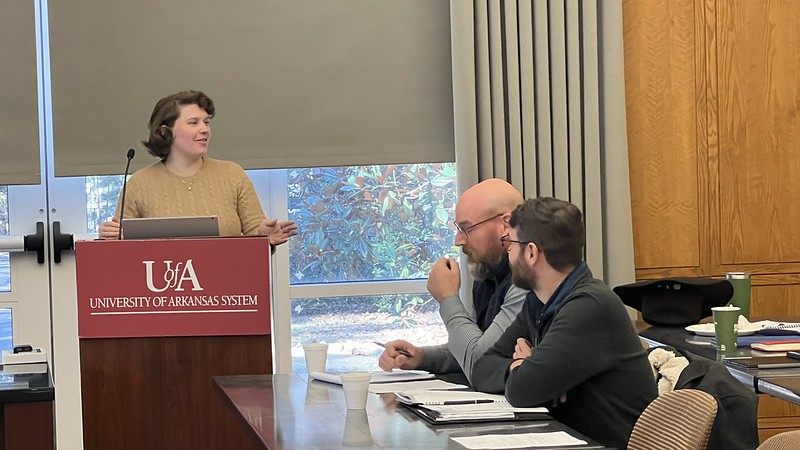“2024 brought in some of the most consequential developments in ag law and policy in a long time.”
— Harrison Pittman
By Mary Hightower
U of Arkansas System Division of Agriculture
Dec. 16, 2024
Fast facts
- 2024 sees SCOTUS upend Chevron
- Federal court vacates dicamba registration
- Arkansas becomes first to enforce foreign-owned land law
LITTLE ROCK — Upending of a 40-year precedent in rulemaking and a pair of end-of-year plot twists for two laws meant to prevent fraud and improve national security were just some of the events that marked a turbulent year in agricultural and environmental laws.
“It seems like just a few days ago we were at the beginning of 2024 and wondering what all might develop in the coming year,” said Harrison Pittman, director of the National Agricultural Law Center. “It turned out that 2024 brought in some of the most consequential developments in ag law and policy in a long time.
“2024 was a blockbuster year of court decisions and other legal developments and it’s hard to imagine how 2025 can top it, but I have a feeling it will,” he said.
Chevron
In June, the United States Supreme Court overturned what was known as the Chevron deference, 40-year-old doctrine which said that courts should generally defer to federal agencies for the rules they make, with the assumption that the agencies are subject matter experts and that the rules are reasonable. Chief Justice John Roberts, in a 35-page decision, called the doctrine “fundamentally misguided.”
“It’s a decision with wide implications that might take years to play out,” said Brigit Rollins, staff attorney for the National Agricultural Law Center.
Dicamba
On Feb. 6, a federal court in Arizona issued a ruling to vacate the labels for three dicamba products that had been registered for use over-the-top of dicamba-resistant soybean and cotton crops.
“The decision was the second time a court had ruled to vacate labels for over-the-top dicamba, and officially leaves farmers without an over-the-top dicamba option for the 2025 growing season,” Rollins said.
Throughout 2024, the Environmental Protection Agency continued to roll out portions of its new policy towards addressing endangered species concerns related to pesticide exposure.
“A finalized version of last year’s herbicide strategy was released on Aug. 20, and a draft of the corresponding insecticide strategy was published in July,” Rollins said. “Both strategies outline pesticide use restrictions that are aimed at reducing pesticide exposure to species listed as threatened or endangered under the Endangered Species Act.”
CEQ upended
A court decision issued by the District of Columbia Circuit Court of Appeals in mid-November unsettled a 50-year-old environmental program after the court determined that the Council on Environmental Quality, or CEQ, lacks rulemaking authority.
“CEQ is the federal agency responsible for administering the National Environmental Policy Act, a law passed by Congress in 1969 that requires all federal agencies to consider the environmental impacts of their actions,” Rollins said. ”Although implementation of NEPA has been largely unchanged in the decades since it was first passed, the recent D.C. Circuit Court ruling has made the future of NEPA uncertain.”
Corporate Transparency Act
The Corporate Transparency Act, or CTA, was still a little-known law heading into the months before the Dec. 31 deadline for businesses to file beneficial owner information in order to comply. The act was passed in 2021 with a goal of cracking down on shell companies and preventing money laundering, said Elizabeth Rumley, senior staff attorney at the National Agricultural Law Center. Reporting required by the law began Jan. 1, 2024, and was expected to affect more than 32 million businesses, including more than 230,000 farm operations, according to the American Farm Bureau.
In March, a federal court in Alabama suspended the law’s requirements for plaintiffs in National Small Business United v. Yellen. On Dec. 3, a federal court in Texas issued a nationwide injunction. The ruling by U.S. District Judge Amos Mazzant in the case Texas Top Cop Shop, Inc. v. Garland determined that the “CTA is likely unconstitutional as outside of Congress’s power. Because the Reporting Rule implements the CTA, it is likely unconstitutional for the same reasons.”
“The federal government has indicated that it plans to appeal the ruling, but at the moment all enforcement of the law, including deadlines, is on hold,” said Elizabeth Rumley, senior staff attorney for the National Agricultural Law Center. “Entities that are required to report should pay close attention to this topic, because future developments may impose or reinstate reporting deadlines with a limited time to respond.”
Foreign ownership
Nearly half of the nation’s states have laws that put some kind of limits on foreign ownership of real property, particularly agricultural land, located within their state. From 2021-22, 12 states proposed such laws, but in 2023, 36 states considered at least one measure that sought to restrict foreign investments, 12 of which enacted such a law.
To read the full article, click here.
